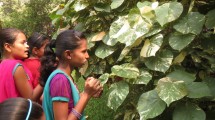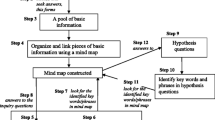Abstract
Primary classrooms provide the learnings in Geography that are the foundation for geographical learnings in the secondary classroom. This chapter concerns the nature of student-generated questions in the Geography lessons of primary classrooms in Australia. The typology of student-generated questions provided in this chapter indicates the need for teachers to provide opportunities for students to discuss their ideas in small groups as well as a whole class. These discussions must encourage the students to question their learnings. This chapter provides an insight into the nature of questioning in the primary Geography classroom – giving a voice to the student. A major conclusion is that student-generated questions and natural discourse concerning geographical concepts and ideas should be included in all primary classrooms as the thinking skills enhanced through student-generated questioning is likely to be transferable to other learning areas.
Access this chapter
Tax calculation will be finalised at checkout
Purchases are for personal use only
Similar content being viewed by others
References
Aflalo E (2018) Students generating questions as a way of learning. Active Learn Higher Educ 22(1):63–75
Anderson LW, Krathwohl DR (eds) (2001) A taxonomy for learning, teaching, and assessing: a revision of Bloom’s taxonomy of educational objectives. Longman, New York
Australian Curriculum, Assessment and Reporting Authority (ACARA) (2011) Shape of the Australian curriculum: geography. Author, Sydney
Australian Curriculum, Assessment and Reporting Authority (ACARA) (2015) Geography Sequence of Content 7–10. v8.1 https://docs.acara.edu.au/resources/Geography_-_Sequence_of_content.pdf
Baram-Tsabari A, Yarden A (2005) Characterizing children’s spontaneous interests in science and technology. Int J Sci Educ 27(5):803–826
Biddulph F, Osborne R (1982) Some issues relating to children’s questions and explanations (LISP(P) Working paper no. 106). University of Waikato, Waikato
Chin C (2004) Students’ questions: fostering a culture of inquisitiveness in science classrooms. School Sci Rev 86(314):107–112
Chin C, Brown DE (2002) Student-generated questions: a meaningful aspect of learning in science. Int J Sci Educ 24(5):521–549
Chin C, Kayalvizhi G (2002) Posing problems for open investigations: what questions do pupils ask? Res Sci Technol Educ 20(2):269–287
Chin C, Osborne J (2008) Students’ questions: a potential resource for teaching and learning science. Stud Sci Educ 44(1):1–39
Dillon JT (1988) The remedial status of student questioning. J Curric Stud 20(3):197–210
Donaldson M (1978) Children’s minds. Falmer Press, London
Elstgeest J (1985) The right question at the right time. In: Harlen W (ed) Primary science: taking the plunge. Heinemann, London, pp 36–46
Gillies R (2003) The behaviours, interactions, and perceptions of junior high school students during small-group learning. J Educ Psychol 95(1):137–147
Graesser A, Olde B (2003) How does one know whether a person understands a device? The quality of the questions the person asks when the device breaks down. J Educ Psychol 95(3):524–536
Gregg M, Leinhardt G (1993) Geography in history: what is the Where? J Geogr 92(2):56–63
Howell J (2014) Teaching and learning: building effective pedagogies. Melbourne, Oxford
Kidman G, Casinader N (2017) Inquiry-based teaching and learning across disciplines: comparative theory and practice in schools. Palgrave Macmillan, London
Laidlaw K-R, Taylor N, Fletcher P (2009) Teaching primary science in rural and regional Australia: some challenges facing practicing and pre-service teachers. J Sci Math Educ Southeast Asia 32(2):105–130
Magrini J (2012) Towards a phenomenological understanding of the ontological aspects of teaching and learning. Philosophy Scholarship. Paper 31
Maskill R, Pedrosa De Jesus H (1997) Pupils’ questions, alternative frameworks and the design of science teaching. Int J Sci Educ 19(7):781–799
Mercer N (1996) The quality of talk in children’s collaborative activity in the classroom. Learn Instr 6(4):359–377
Pedrosa de Jesus H, Neri De Souza F, Teixiera-Dias JJC, Watts M (2005) Organising the chemistry of question-based learning: a case study. Res Sci Technol Educ 23(2):179–193
Pontinen S, Karkkainen S, Pihlainen K, Raty-Zaborszky S (2019) Pupil-generated questions in a collaborative open inquiry. Educ Sci 9:1–15
Portnoy LB, Rabinowitz M (2014) What's in a domain: understanding how students approach questioning in history and science. Educ Res Eval 20(2):122–145
Resendes M (2014) Enhancing knowledge building discourse in early primary education: effects of formative feedback. Unpublished doctoral dissertation, University of Toronto
Rosenshine B, Meister C, Chapman S (1996) Teaching students to generate questions: a review of the intervention studies. Rev Educ Res 66(2):181–221. http://www.jstor.org/stable/1170607
Scardamalia M, Bereiter C (1992) Text-based and knowledge-based questioning by children. Cognit Instr 9(3):177–199
Shodell M (1995) The question-driven classroom: students questions as course curriculum in biology. Am Biol Teach 57(5):278–281
Skamp K (2012) Teaching primary science constructively. Cengage Learning, Melbourne
Watts M, Alsop S (1995) Questioning and conceptual understanding: the quality of pupils’ questions in science. School Sci Rev 76(277):91–95
White RT, Gunstone RF (1992) Probing understanding. Falmer Press, London
Author information
Authors and Affiliations
Corresponding author
Editor information
Editors and Affiliations
Rights and permissions
Copyright information
© 2022 Springer Nature Switzerland AG
About this chapter
Cite this chapter
Kidman, G. (2022). Geographical Question Typologies: Student-Generated Questions. In: Kidman, G., Schmeinck, D. (eds) Teaching Primary Geography. Key Challenges in Geography. Springer, Cham. https://doi.org/10.1007/978-3-030-99970-4_6
Download citation
DOI: https://doi.org/10.1007/978-3-030-99970-4_6
Published:
Publisher Name: Springer, Cham
Print ISBN: 978-3-030-99969-8
Online ISBN: 978-3-030-99970-4
eBook Packages: Social SciencesSocial Sciences (R0)




